Simple blood test helps evaluate risk of early acute rejection, providing data that may inform post-transplant immunosuppression management
Thermo Fisher Scientific, the world leader in serving science, has introduced a new pre-transplant risk assessment assay via its CLIA laboratory in Fishers, Ind., that helps assess risk of early acute rejection in kidney transplant recipients, providing data that may inform a more personalized approach to post-transplant immunosuppression management.
Standardized immunosuppression protocols based on broad clinical and demographic features are a routine part of care for most of the 250,000 Americans living with a kidney transplant. While effective in reducing overall rates of rejection, such protocols can also result in over-immunosuppression, which may lead to poor long-term outcomes; patient complications such as toxicity, cancer and serious infections; and considerable costs to the healthcare system.
“Our One Lambda™ Pre-Transplant Risk Assessment (PTRA) Assay is the first test of its kind to provide a risk score for early acute rejection based on a patient’s unique gene profile prior to transplant. Data from this test may help clinicians make more informed decisions about post-transplant management and better balance a patient’s risk of rejection against the adverse effects of over-immunosuppression,” says Chris McCloskey, director, Transplant Services, Thermo Fisher Scientific.
The PTRA Assay utilizes an mRNA signature of 29 markers to help stratify patients into high- and low-risk categories for early acute rejection. A recent clinical validation study observed that patients with high PTRA scores were six times more likely to experience early acute rejection than patients with low-risk scores, a statistically significant finding. The assay also demonstrated superior prognostic accuracy when compared to commonly considered risk factors such as high positive panel-reactive antibodies (PRA) and the number of HLA mismatches, which were not shown to be predictive of early acute rejection.
“We’re excited to introduce this innovative new tool to help inform clinical decision-making and support more personalized patient management, with the ultimate aim of improving outcomes. Alongside our comprehensive suite of pre- and post-transplant diagnostic solutions, the PTRA Assay reinforces our commitment to enabling our customers to improve quality of life for transplant patients throughout the transplant journey,” says Tina Liedtky, president, Transplant Diagnostics, Thermo Fisher Scientific.
Learn more at thermofisher.com/PTRA
The One Lambda Pre-Transplant Risk Assessment Assay was developed and validated by Thermo Fisher One Lambda Laboratories. This laboratory developed test (LDT) is used for clinical purposes by the CLIA-certified laboratory performing the test. This test has not been cleared or approved by the FDA as an in vitro diagnostic test.
About Thermo Fisher Scientific
Thermo Fisher Scientific Inc. is the world leader in serving science, with annual revenue over $40 billion. Our Mission is to enable our customers to make the world healthier, cleaner and safer. Whether our customers are accelerating life sciences research, solving complex analytical challenges, increasing productivity in their laboratories, improving patient health through diagnostics or the development and manufacture of life-changing therapies, we are here to support them. Our global team delivers an unrivaled combination of innovative technologies, purchasing convenience and pharmaceutical services through our industry-leading brands, including Thermo Scientific, Applied Biosystems, Invitrogen, Fisher Scientific, Unity Lab Services, Patheon and PPD. For more information, please visit www.thermofisher.com.
View source version on businesswire.com: https://www.businesswire.com/news/home/20240730822179/en/
Contacts
Amber Gabrenas
760-681-6678
amber.gabrenas@thermofisher.com






